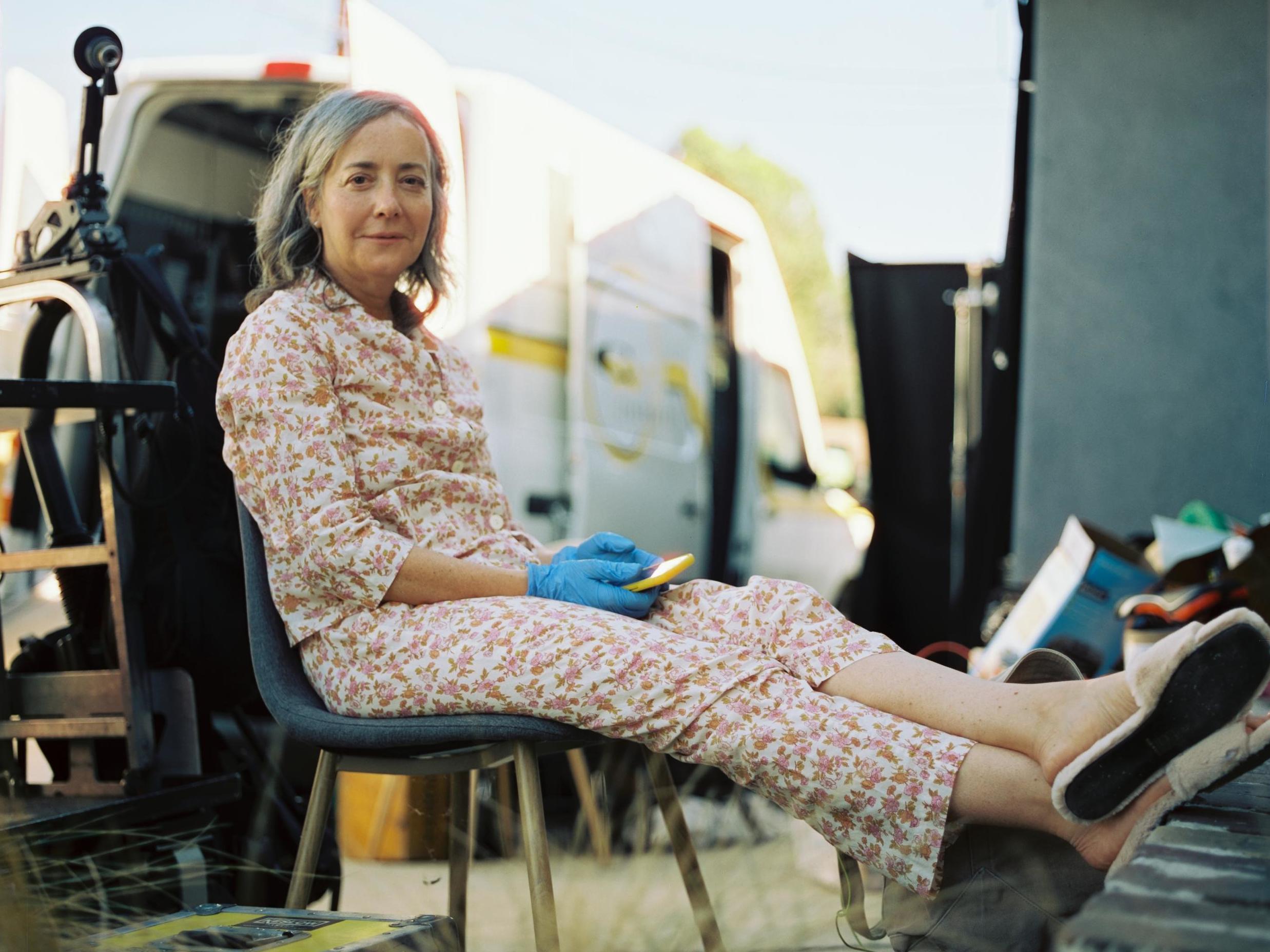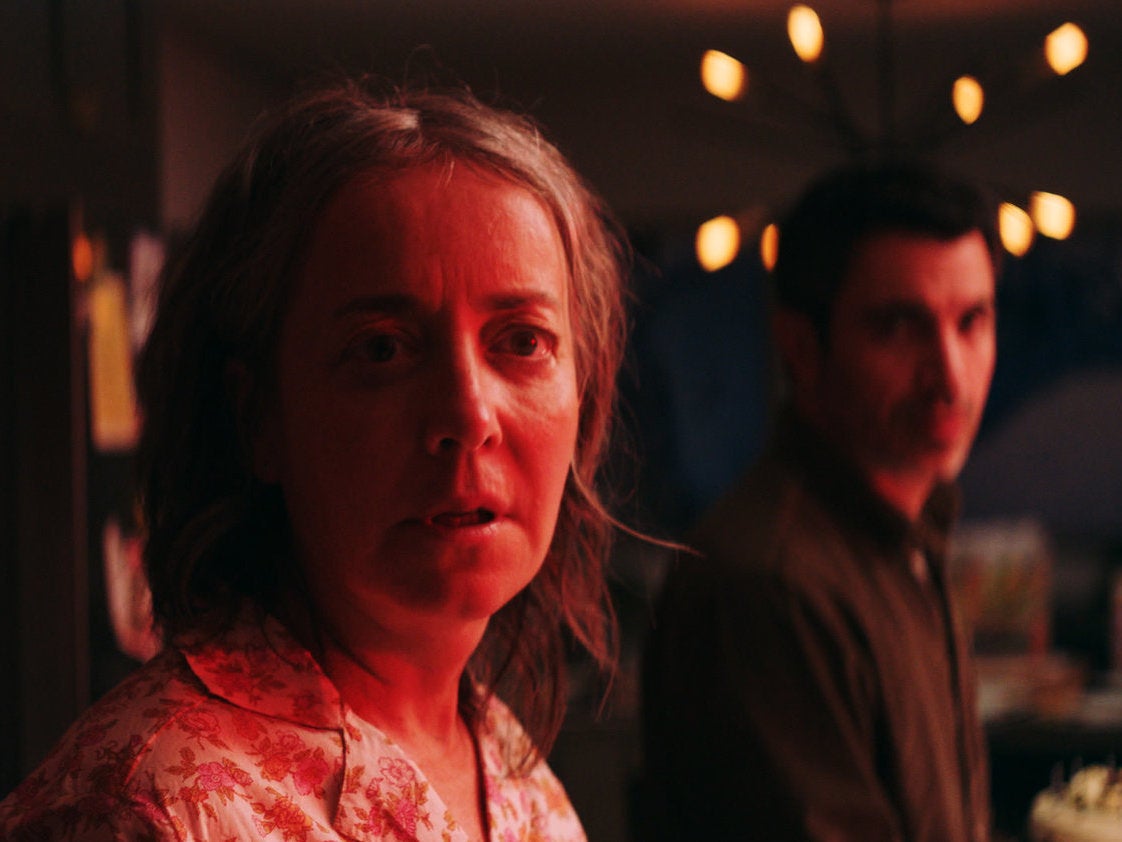Jane Adams: ‘This whole idea of stay safe – life’s never been safe’
The indie actor is starring in the eerily prescient film ‘She Dies Tomorrow’, about a virus that signals the end of the world. But her own take on the pandemic is more fight or flight, she tells Ashley Boone

Your support helps us to tell the story
From reproductive rights to climate change to Big Tech, The Independent is on the ground when the story is developing. Whether it's investigating the financials of Elon Musk's pro-Trump PAC or producing our latest documentary, 'The A Word', which shines a light on the American women fighting for reproductive rights, we know how important it is to parse out the facts from the messaging.
At such a critical moment in US history, we need reporters on the ground. Your donation allows us to keep sending journalists to speak to both sides of the story.
The Independent is trusted by Americans across the entire political spectrum. And unlike many other quality news outlets, we choose not to lock Americans out of our reporting and analysis with paywalls. We believe quality journalism should be available to everyone, paid for by those who can afford it.
Your support makes all the difference.Jane Adams is on the phone from California and has had enough of supposed lockdown scare tactics. “I feel like it’s a very important time for people to get tougher,” says the American actor. “I know people who have succumbed to fear. They’re not leaving their houses. None of it’s really making sense. I’m feeling, like, why are we still all under house arrest? If I’m going to die, I’m going to die.”
It is, perhaps, unusual for actors to be so forthright but then Adams has always skirted around the edges of fame. Rarely the lead, she’s the type of actor you cast if you want the world of your film to feel believable but ever so slightly eccentric. Take her role as Dr Mel Karnofsky in the Nineties sitcom Frasier, the second wife of Niles Crane, her equal in emotional fragility. Her films have been an eclectic body of work packed with wonderfully neurotic, though deliberately unshowy performances, including Father of the Bride Part II (1995), Wonder Boys (2000), Eternal Sunshine of the Spotless Mind (2004) and the Poltergeist reboot (2015). She’s also won a Tony, the prestigious Broadway award, for a 1994 revival of An Inspector Calls, which doubled up as her professional breakthrough.
Adams, 55, has reaffirmed her indie cred with She Dies Tomorrow. The film focuses on a mind virus that spreads from person to person, implanting the thought in each that this will be their last day on earth. Her character, also named Jane, may start off sceptical, but she ends up becoming just one strand in a vast web of despair and hopelessness, as she catches the virus from her best friend Amy (Kate Lyn Sheil), then passes it on to her brother (Chris Messina) and his wife (Katie Aselton).
The film was originally conceived as an exploration of the director Amy Seimetz’s own relationship with anxiety and existential dread but has obviously since been seized upon as a metaphor for the coronavirus era. Seimetz shows us how thin the barrier preventing us from spiralling down into madness is. It’s a profoundly horrific realisation.
Adams, however, is more fight or flight about the future. “Either you’re gonna make it through the day or you’re not,” she says. In She Dies Tomorrow, death comes with a warning, but not with a reason. Adams talks of her father – an electronic engineer, naval officer, and cryptologist – and her mother, who worked as a secretary for the CIA, then as an administrative assistant at Boeing. Perhaps this proximity to authority bred an eventual distrust in it, though the childhood she describes, spread across Washington and Illinois, is a rosy one. She was encouraged to pursue her artistic inclinations wherever they led her. At first, it was painting and pottery, then acting classes.

Her worldview isn’t necessarily combative, but resistant to any form of status quo. She is loquacious, cordial, and forthright at all times, presenting her opinions as a series of questions. And she certainly has questions about the pandemic. On the subject of mask-wearing, she says matter-of-factly: “Are you sure? Like, are you sure that’s the solution? Because the scientists and the doctors have been very much back and forth on all of this. I want to say very clearly: I have no idea what’s going on.”
Although she does venture some ideas, not always rooted in fact. In her mind, there’s as much of a chance she’ll be crushed to death pulling out onto the Pacific Coast Highway near her home as there is from the virus when in fact an estimated 38,800 Americans were killed in traffic accidents in 2019 compared to more than 175,000 this year in the US from Covid-19.
“I don’t want to get it,” she begins, “but really then I have to assess and look at information and decide, how much of my life am I going to keep living?
“It’s really dangerous living here. But it’s always been that way. Like this whole idea of like, ‘stay safe’. Life’s never been safe.”

Watch Apple TV+ free for 7 days
New subscribers only. £8.99/mo. after free trial. Plan auto-renews until cancelled

Watch Apple TV+ free for 7 days
New subscribers only. £8.99/mo. after free trial. Plan auto-renews until cancelled
She catches herself. “My friends would laugh if they heard you asking me this right now,” she says, “because a couple of them would be like, ‘Oh no, here we go’.”
She admits there’s somewhat of a gulf between her own ideas and those presented by Seimetz in She Dies Tomorrow, where her character’s emotional paralysis is seen as a natural and justified reaction to coming face to face with her own mortality. (Her character, once infected, turns up at her brother’s still in her pyjamas, her face robbed of any discernible expression.) But she says that off-camera, the director and actor are close. “We enjoy the dialogue that we have and the different ideas and, to me, it’s very funny,” the actor says. “It’s been very easy for us to talk, you know?”
It’s the same way she talks about her friendship with indie filmmaker and king of the “mumblecore” genre, Joe Swanberg. The pair have worked on several projects together, including All the Light in the Sky (2013), which Adams has a co-writing credit on, and Netflix’s Easy. The latter, which aired between 2016 and 2019, is an anthology series set in Chicago, concerned primarily with the aches and pains of modern love. Adams plays Annabelle, one of several recurring characters whose stories weave in and out of the action.
Annabelle is best friends with comics author and professor Jacob (Marc Maron), whose notoriety has increasingly overshadowed his talents, following a series of public embarrassments. His story ends in one of the most finely tuned moments in Easy – an affecting scene where he is confronted by one of his former graduates, Beth (Melanie Lynskey), about their past sexual relationship. While their interactions were consensual, what Beth makes clear is that the deep imbalance of power between the two of them, as teacher and student, affected her in ways that Jacob never stopped to contemplate. He built up her confidence with assurances that she was talented, that he’d help her kickstart her career. As soon as they had sex, he ghosted her.
“I said to Joe, I love that scene,” Adams says. “On top of it, though, I wish that there was more acknowledgement of her personal responsibility in what took place. What is her power in that situation?” She continues: “When did you become a victim? Who was seducing who? Is anybody really clear about that ever? Being young and attractive, that’s a powerful position. You disempower women when you turn them into victims.” She adds, for clarification: “It’s not that I’m against anything. It’s just a question I have that is interesting to me.”
This isn’t the only time Adams brings up the phrase “personal responsibility”. Casually put forth, as an offhand comment about the pandemic, she at one point mentions: “Personal responsibility really interests me. You know, my dad used to say: ‘Life isn’t fair. What are you going to do about it?’” It’s one of those instances in which someone inadvertently but immaculately sums up their own character – a kind of Eureka moment for any psychoanalyst. Adams’s performances speak for themselves. So does she.
She Dies Tomorrow is out now
Join our commenting forum
Join thought-provoking conversations, follow other Independent readers and see their replies
Comments